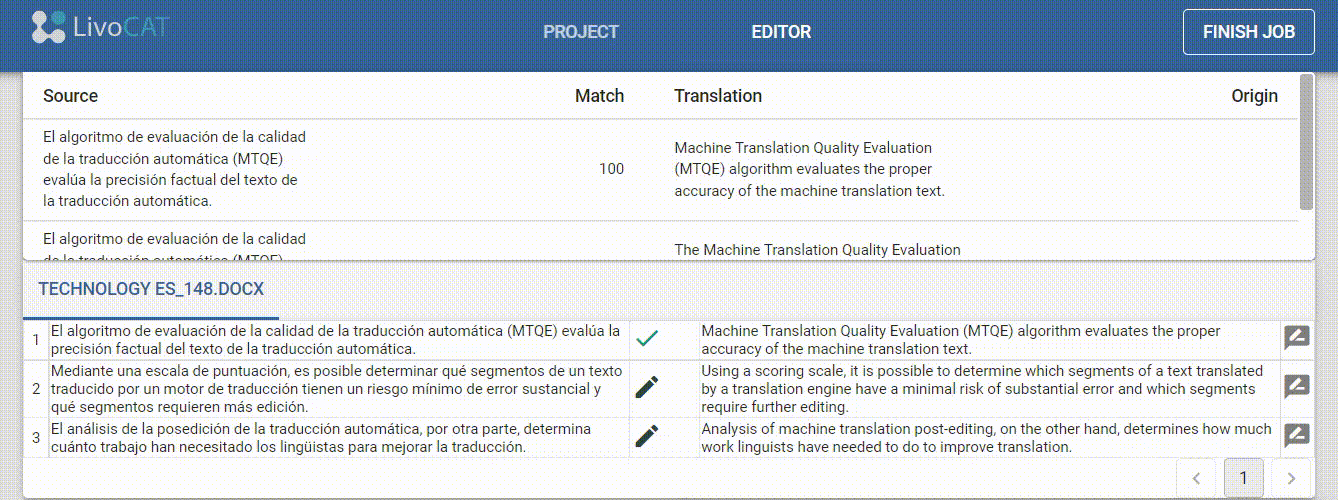Post-editing
Postedycja tłumaczeń maszynowych – skuteczność i jakość
Post-editing is the process of correcting a translation generated by a machine. Thanks to it the content becomes clear, coherent and natural in language. We offer post-editing that combines the speed of machine translation with the precision of human language. The service is useful wherever time and accuracy matter. Corrections cover lexical, syntactic and grammatical errors as well as cultural mismatches.
Our agency specialises in professional post-editing across many industries – technical, medical, financial and e-commerce. Our team of linguists analyses every text for clarity and terminological consistency. Post-editing enables quick adaptation of content to the requirements of the end user. This allows a significant reduction in time-to-market without losing quality.

Simultaneous Interpretation
- Accurate communication at conferences and large events
- Ideal for congresses and international gatherings
- Real-time translation without disrupting the flow
- Can cover multiple languages simultaneously
Consecutive Interpretation
- Perfect for business meetings and negotiations
- Translator speaks after the speaker finishes a segment
- Allows interaction and detailed discussion
- Extends meeting duration but increases translation accuracy
Whispered Interpretation
- Discreet solution for small groups
- Commonly used during diplomatic or business meetings
- Delivered quietly, without equipment
- Suitable for up to three participants
Certified Oral Translation
- Official translation required by governmental institutions
- Needed for signing notarial deeds and contracts
- Essential in court or administrative proceedings
- Certified translators authenticate documents with signature and seal
Post-editing for multilingual content
For globally operating companies post-editing is an effective way to reduce localisation costs. Machine translations, though fast, often need correction. This is where post-editing comes in. It ensures consistency of communication across all languages. We adapt style, tone and message to the needs of local audiences.
Our services include post-editing of translations generated by AI systems such as Google Translate, DeepL or Amazon Translate. Corrections are made by translators experienced in the relevant field. We take into account industry specifics and cultural context. As a result you receive text ready for publication or print. Post-editing guarantees quality while maintaining fast turnaround. It helps you avoid errors that could damage your company’s image.
Types of services – post-editing tailored to your needs
We offer two levels of service: “light” and “full” post-editing. The light version focuses on language correctness and basic errors. It is ideal for internal content, quick communication or supporting materials. The full version provides comprehensive stylistic, terminological and grammatical editing. It is suitable for publications, formal documents and marketing content.
Extended post-editing also includes alignment with brand voice guidelines. We standardise vocabulary and terminology according to the client’s glossaries. We ensure compliance with industry standards such as ISO or EN. Translators work with modern CAT tools which guarantee consistency and quality control. Post-editing is carried out by experienced language professionals. This means you receive text ready for use without additional proofreading.
Here is how MTPE works

Post-editing in the translation process – savings and efficiency
We integrate post-editing with localisation and content publishing workflows. We adjust the pace and scope of service to client requirements. For cyclical projects or large volumes we offer tailored solutions. This is an ideal option for companies with extensive international communication.
Post-editing supports the strategy of rapid product launches in new markets. It reduces the cost of manual translation while maintaining user-acceptable quality. We work with companies in IT, e-learning, marketing and industry. Each project undergoes an internal QA process. Thanks to this post-editing meets high linguistic and business standards. Choose a service that combines technology with human expertise.
It is important to note that when post-editing machine translation one should not expect the same level of quality and thoroughness from the post-editor as from a translation produced entirely by a human.
The language industry organisation TAUS distinguishes two levels of machine translation post-editing: “Good enough” and “Human-like”. The relevant guidelines are as follows:
| Criterion | Good enough – light post-editing | Human-like – full post-editing |
| Use as much of the raw MT text as possible | ✓ | ✓ |
| Strive for semantic accuracy | ✓ | ✓ |
| Strive for grammatical and syntactic correctness | ✓ | |
| Ensure no information has been accidentally added or omitted | ✓ | ✓ |
| Edit any offensive, inappropriate or culturally unacceptable content | ✓ | ✓ |
| Ensure basic spelling rules are observed | ✓ | ✓ |
| Ensure key terminology is correctly translated | ✓ | |
| Make stylistic improvements only | At linguist’s discretion | |
| Rephrase sentences solely to improve the text | At linguist’s discretion | |
| Ensure formatting is correct | ✓ |